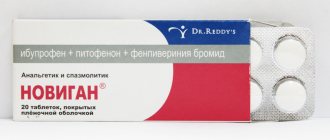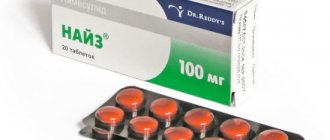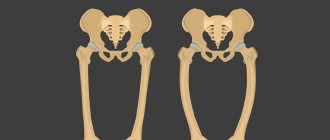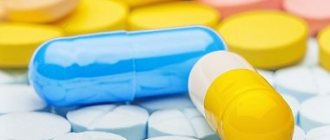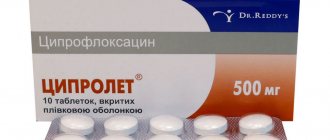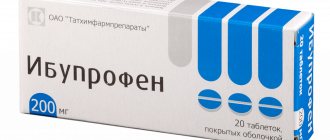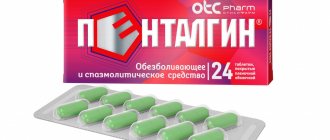Compound
The tablets contain the active ingredient ibuprofen (200/400/500 mg) and excipients: potato starch, magnesium stearate, aerosil, vanillin, beeswax, food gelatin, azorubine dye, magnesium hydroxycarbonate, wheat flour, low molecular weight povidone, sucrose, dioxide titanium.
In the ointment and gel, the active substance is contained in a concentration of 50 mg/g, in the suspension - in a concentration of 20 mg/ml.
Auxiliary components of the gel: ethanol, propylene glycol, dimexide, carbomer 940, triethanolamine, neroli and lavender oil, methyl parahydroxybenzoate, purified water.
Auxiliary components of the ointment: dimethyl sulfoxide, macrogol 400 and 1500.
Ibuprofen in suppository form contains 60 mg of active substance and solid fat.
Pharmacodynamics and pharmacokinetics
The effects of the drug are due to the suppression of Pg biosynthesis by inhibiting the COX enzyme.
Suppresses platelet . It has no effect on proteins that are involved in blood clotting. Slightly increases bleeding time.
When applied externally, the patient experiences a decrease in joint pain at rest and during movement; reducing morning stiffness, swelling and swelling of the joints, increasing flexibility and range of motion of the joints.
When taken orally, it is well (80%) absorbed into the gastrointestinal tract. Concomitant use with food slows down absorption, but does not affect its volume. TSmax - 2-4 hours.
The hypothermic effect develops 1 hour after administration. T1/2 - from 2 to 4 hours. Communication with plasma proteins is 90-99%.
It penetrates into the joint cavities slowly, lingers in the synovial tissue, where it accumulates in higher concentrations than in the plasma.
Achieving an anti-inflammatory effect requires from several days to 2 weeks of systematic use of the drug.
Biological activity is associated with the S-enantiomer.
After absorption, the pharmacologically inactive R-form (about 60%) is slowly transformed into the S-form. Metabolic products are excreted primarily by the kidneys and, partly, with bile. In its pure form, no more than 1% of ibuprofen is excreted.
The substance is not detected in breast milk. Complete removal occurs within 24 hours.
IBUPROFEN-CHEMOPHARM
Interaction
Concomitant use of ibuprofen with acetylsalicylic acid and other NSAIDs is not recommended.
When administered simultaneously, ibuprofen reduces the anti-inflammatory and antiplatelet effects of ASA (an increase in the incidence of acute coronary insufficiency in patients receiving small doses of ASA as an antiplatelet agent is possible after starting ibuprofen).
When prescribed with anticoagulant and thrombolytic drugs (alteplase, streptokinase, urokinase), the risk of bleeding simultaneously increases.
Concomitant use with serotonin reuptake inhibitors (citalopram, fluoxetine, paroxetine, sertraline) increases the risk of developing serious gastrointestinal bleeding. Cefamandole, cefaperazone, cefotetan, valproic acid, plicachycin increase the incidence of hypoprothrombinemia.
Cyclosporine and gold preparations enhance the effect of ibuprofen on the synthesis of prostaglandins in the kidneys, which is manifested by increased nephrotoxicity. Ibuprofen increases the plasma concentration of cyclosporine and the likelihood of developing its hepatotoxic effects.
Drugs that block tubular secretion reduce excretion and increase plasma concentrations of ibuprofen.
Inducers of microsomal oxidation (phenytoin, ethanol, barbiturates, rifampicin, phenylbutazone, tricyclic antidepressants) increase the production of hydroxylated active metabolites, increasing the risk of developing severe hepatotoxic intoxications.
Microsomal oxidation inhibitors reduce the risk of hepatotoxicity.
Reduces the hypotensive activity of vasodilators (including slow calcium channel blockers (SCBC), angiotensin-converting enzyme (ACE) inhibitors), natriuretic and diuretic activity - furosemide and hydrochlorothiazide.
Reduces the effectiveness of uricosuric drugs, enhances the effect of indirect anticoagulants, antiplatelet agents, fibrinolytics (increasing the risk of hemorrhagic complications), enhances the ulcerogenic effect with bleeding of mineralocorticosteroids (MCS) and glucocorticosteroids (GCS), colchicine, estrogens, ethanol.
Enhances the effect of oral hypoglycemic drugs (including sulfonylurea derivatives) and insulin.
Antacids and cholestyramine reduce the absorption of ibuprofen.
Increases the blood concentration of digoxin, lithium and methotrexate.
Caffeine enhances the analgesic effect.
Myelotoxic drugs increase the manifestations of hematotoxicity of the drug.
Indications for use
Ibuprofen - what is it?
Ibuprofen is a non-narcotic analgesic that belongs to the NSAID group. Has pronounced anti-inflammatory activity.
These properties allow the drug to be used for heat and pain (mild and moderate intensity), polymyalgia rheumatica , and inflammatory and degenerative diseases of the musculoskeletal system.
Ibuprofen is included in the WHO list of essential medicines.
What is Ibuprofen tablets for?
Tablets are prescribed for:
- inflammatory diseases of the spine and joints ( ankylosing spondylitis , gouty and rheumatoid arthritis , osteoarthritis , etc.);
- moderate pain of various etiologies (the medicine helps with pain during menstruation, toothache, headache, migraine attack , myalgia , neuralgia , post-traumatic and postoperative pain, etc.);
- fever due to infectious or colds.
It should be remembered that tablets (like other dosage forms) are intended for symptomatic therapy, reducing pain intensity and relieving inflammation; the medicine has no effect on the progression of pathology.
Indications for use of gel and ointment
Gel and ointment with ibuprofen are effective for inflammatory and degenerative diseases of the musculoskeletal system:
- psoriatic , gouty and rheumatoid arthritis ;
- humeroscapular periarthritis;
- osteoarthritis;
- radicular syndrome in osteochondrosis ;
- ankylosing spondylitis;
- bursitis;
- sciatica;
- lumbago;
- radiculitis;
- myalgia;
- tendovaginitis;
- tendonitis;
- worsened gout;
- injuries in which the integrity of soft tissues is not compromised (rupture/sprain of ligaments, dislocation, bruise, post-traumatic swelling, etc.).
Indications for use of suppositories and syrup
Ibuprofen syrup and suppositories are dosage forms that were developed specifically for use in pediatric practice. They are prescribed to children for:
- reducing temperature during acute respiratory viral infections , childhood infections, influenza and other infectious and inflammatory diseases ;
- decrease in temperature during post-vaccination reactions;
- reducing the intensity of mild/moderate pain (the product can be used for toothache and headache, ear or throat pain, ligament damage, neuralgia, etc.).
Suppositories are intended for children 3-24 months, Ibuprofen syrup is used to treat children from 3 months to 12 years.
What is Ibuprofen used for injection?
Injections are used to treat congenital heart disease in premature newborns.
Composition of the drug
Tablets called "Ibuprofen" contain the main substance called the same term. Each capsule contains 200 mg of this component. Additional substances in the product include: sucrose, gelatin, potato starch.
Ibuprofen for toothache is allowed to be used in extreme cases, for example, if it is not possible to urgently see a doctor. It is important to follow all dosages and rules of use of the drug specified in the instructions. The tablets are for oral administration only.
After treatment, be sure to contact a dentist, since only he can accurately determine the problem and find an effective way to solve it. When visiting a doctor, the patient must inform them that they have taken the drug so that the dentist can more accurately determine the advanced stage of the disease.
According to patient reviews, the drug helps 20 minutes after oral administration. The pain subsides on average for 6 hours. However, we must remember that each person’s body is individual, so the duration of the therapeutic effect of the drug will differ for each patient.
If no therapeutic effect was noted after taking Ibuprofen, then you should not take the capsules again. In this case, it is better to urgently visit a doctor or call an ambulance.
Contraindications
General contraindications:
- complete or partial combination of symptoms of the Fernand-Vidal triad (including a history);
- the presence of erosions and ulcers in the digestive canal;
- hemostasis disorders ;
- active gastric/intestinal bleeding ;
- severe liver failure;
- progressive kidney pathologies;
- renal failure in which Clcr does not exceed 30 ml/min;
- conditions after CABG ( coronary artery bypass grafting );
- chronic inflammatory processes in the intestines;
- confirmed hyperkalemia ;
- 3rd trimester of pregnancy;
- hypersensitivity.
In pediatrics, suspension and suppositories are used from 3 months, tablets - from 6 years of age.
Caution should be exercised when prescribing Ibuprofen for:
- liver cirrhosis , which is complicated by portal hypertension ;
- gastritis;
- colitis;
- enteritis;
- history of stomach/duodenal ulcer
- nephrotic syndrome;
- insufficiency of heart, kidney or liver function;
- IHD;
- arterial hypertension;
- cerebrovascular diseases;
- dys- or hyperlipidemia ;
- peripheral arterial diseases;
- the presence of Helicobacter pylori infection ;
- severe somatic pathologies;
- blood diseases of unknown etiology.
The drug is also prescribed with caution to persons suffering from alcoholism , long-term use of NSAIDs, taking oral corticosteroids, SSRIs, antiplatelet agents and anticoagulants, in the first 26-27 weeks of pregnancy, and lactating women.
Children under one year of age should be given the drug only on the recommendation of a pediatrician.
Action of the medication
Does Ibuprofen help with toothache? The drug can eliminate several unpleasant symptoms that accompany dental problems:
- pain;
- temperature increase;
- swelling and inflammation of the soft tissues of the mouth.
Pain is a signal from the brain that problems are occurring in the body. Discomfort in the oral cavity is a symptom that the tooth is undergoing destruction under the influence of pathogenic flora
If pain is observed constantly, this means that the nerve endings of the tooth or the soft tissue located next to it have been destroyed. Ibuprofen reduces symptoms of discomfort by blocking nerve impulses from the affected area to the brain.
You cannot rely only on the effect of painkillers. The person will not feel discomfort, but the destructive processes in the dental tissues will continue. This condition can lead to more dangerous complications and loss of the unit.
The main advantage of Ibuprofen is that it has a complex effect on the body. That is, a person does not need to take a handful of pills to eliminate fever, relieve swelling of soft tissues and relieve pain. A small amount of medication is enough to cope with the signs of dental diseases. Thanks to this property, the load on internal organs (kidneys, liver, pancreas) is reduced.
Side effects
The annotation for dosage forms for oral use and rectal suppositories lists the following side effects:
- NSAID gastropathy , dryness, irritation and/or ulceration of the oral mucosa, pain in the mouth, pancreatitis , aphthous stomatitis ;
- hepatitis;
- bronchospasm , shortness of breath ;
- noise/ringing in the ears, hearing loss;
- double vision or decreased clarity of visual images, irritation and dry eyes, toxic damage to the optic nerve , scotoma , swelling of the eyelids, swelling of the conjunctiva;
- nervousness, headache, anxiety, confusion, insomnia/drowsiness, dizziness, mental and motor agitation, hallucinations, depression, aseptic meningitis (rare and mainly in patients with autoimmune diseases );
- decreased contractility of the heart muscle, increased blood pressure, tachycardia ; acute renal failure, polyuria , nephrotic syndrome , allergic nephritis , cystitis ;
- hypersensitivity reactions;
- anemia , thrombocyto- and leukopenia , Werlhof's disease , agranulocytosis ;
- increased sweating.
The likelihood of visual impairment, development of gastric/intestinal bleeding and ulceration of the walls of the digestive canal increases with long-term use of high doses of Ibuprofen.
The drug affects laboratory parameters, namely:
- increases bleeding time;
- reduces serum glucose concentration, Clcr, hematocrit and hemoglobin ;
- increases the activity of liver transaminases;
- increases the concentration of creatinine in the blood serum.
Side effects when applied topically in gel/ointment form:
- tingling/burning sensation;
- skin hyperemia.
With long-term use of external therapy, the systemic effects inherent in all NSAIDs may develop.
Contraindications and side effects
The medicine is taken after studying all contraindications to it. This will make it easier to minimize the risk of side effects, including:
Home remedy for toothache
- bronchospasms and shortness of breath;
- problems from the gastrointestinal tract: nausea, vomiting, diarrhea, pain in the upper abdomen;
- headache;
- deterioration of visual and auditory functions;
- allergic reactions from the skin (rashes on the body) and the respiratory system (swelling of the larynx, attacks of suffocation);
- exacerbation of cystitis and nephritis;
- increased sweating;
- internal bleeding (usually observed with long-term use of the drug).
If you notice any of the above symptoms, you should immediately stop taking Ibuprofen and consult your doctor.
You should refrain from using the product if you have one of the following pathologies:
- gastrointestinal disorders;
- inflammatory bowel diseases;
- problems with blood clotting.
Ibuprofen is prohibited for children under 6 years of age; pregnant women; persons with individual intolerance to acetylsalicylic acid; patients who have recently undergone surgery.
Ibuprofen therapy should be used with caution during breastfeeding, since the active component passes into breast milk in small quantities. However, in practice, doctors have identified negative reactions for the child when a nursing mother takes an anesthetic. Elderly people and people suffering from diabetes need to take the medicine carefully.
Instructions for use of Ibuprofen (Method and dosage)
Ibuprofen tablets, instructions for use
The optimal dosage for children over 12 years of age and adults is 3-4 tablets of 200 mg. To achieve the desired effect, the dose can be increased to 1.2 g/day. (it should be divided into 3 doses).
When the required therapeutic effect is achieved, the daily dose should be reduced to 3-4 tablets of 200 mg per day.
The first dose is taken in the morning before meals, with a sufficient amount of liquid (this will allow the drug to be absorbed more quickly into the gastrointestinal tract). Later throughout the day, tablets are taken after meals.
The highest single dose is 400 mg (2 tablets of 200 mg), daily dose is 1.2 g (no more than 6 tablets of 200 mg within 24 hours). It is not recommended to take a repeat dose earlier than after 4 hours. Without medical advice, the drug should be taken for no more than 5 days in a row. Also, consultation with a specialist is necessary in cases where the tablets are used to treat a child under 12 years of age.
A child 6-12 years old can be given 1 tablet up to 4 times a day. A prerequisite is a weight of more than 20 kg. An interval of at least 6 hours should be maintained between tablet doses. The highest dose for this group of patients is 30 mg/kg/day.
There is no difference in how to take drugs from different manufacturers (for example, Ibuprofen-Belmed, Ibuprofen-Hemofarm or Ibuprofen-Darnitsa).
Instructions for candles
Suppositories are used rectally.
For pain and fever, the drug should be dosed based on the age and weight of the child. A single dose varies from 5 to 10 mg/kg. Frequency of applications - 3-4 rubles/day. The highest dose is 30 mg/kg/day.
The instructions for use for children indicate that patients weighing from 5.5 to 8 kg (3-9 months) should be administered 60 mg (1 suppository) every 6-8 hours, but no more than 3 suppositories per day. day. The highest dose for patients weighing from 8 to 12.5 kg (9-24 months) is 240 mg/day. (4 suppositories of 60 mg each).
To relieve fever, which is a consequence of immunization, in children under 12 months. 1 suppository of 60 mg should be administered and, if necessary, another 1 after 6 hours.
Ibuprofen suppositories can be used as an antipyretic for children for no more than 3 days. in a row, and as an analgesic - no more than 5 days. contract.
If fever persists after this time, consult a doctor.
Ibuprofen gel, instructions for use
Adults and children over 12 years of age should squeeze out a strip of gel 4-10 cm long and rub the drug with light movements until completely absorbed into the area of pain projection.
The procedure can be repeated no earlier than 4 hours later. Ibuprofen is used no more than 4 times during the day. The dose depends on the extent of the painful area and varies from 50 to 125 mg.
For children 6-12 years old, a single dose is equal to the volume of a gel strip 2 to 4 cm long. The drug can be used no more than 3 times a day.
Treatment is continued for 2 to 3 weeks.
Ibuprofen ointment, instructions for use
The ointment is applied externally in the same way as the gel. The medicine is applied to the painful area 3 or 4 times a day. within 2-3 weeks. A single dose is equal to the volume of a gel strip 5 to 10 cm long.
How to take children's Ibuprofen (suspension)?
The suspension is given to children 3 times a day. at a dose of 5-10 mg/kg.
Children under one year of age can be given the drug only as prescribed by a pediatrician. The highest dose for infants is 10 ml/day. (2.5 ml 4 times/day).
Syrup for children from one to 12 years old is given 3 rubles per day. in a dose of 5 to 15 ml.
If pain and fever in a 3-6 month old child are a consequence of vaccination, 2 times a day should be given per 5-7.6 kg of body weight. 2.5 ml of suspension. After the first dose, the drug is repeated no earlier than 6 hours later.
Instructions for Ibuprofen solution for children
Ibuprofen injections are prescribed exclusively to premature infants with heart pathologies (in particular, with an unclosed ductus arteriosus).
Treatment is carried out in the intensive care unit and under the supervision of a neonatologist. Ibuprofen is administered intravenously 3 times at intervals of 24 hours. The dosage is selected depending on the child’s weight.
The first dose is 10, the second and third are 5 mg/kg.
The drug is infused slowly (over 15 minutes), preferably undiluted. If necessary, the injected volume is adjusted with 0.9% NaCl solution (or 5% glucose). The remaining unused solution is disposed of.
When determining the volume of injected solution, the total daily volume of prescribed fluid is taken into account.
If, after the child receives 1 or 2 doses, he develops overt oliguria or anuria , the next dose is administered only after restoration of normal diuresis .
If the botal duct is open 24 hours after the last dose or opens again, a repeat course is allowed, which also consists of 3 doses of the drug. If in this case it is not possible to achieve closure of the duct, the child may require surgical treatment.
Methods of application
Ibuprofen is used when it is not possible to see a doctor immediately. It is advisable that after taking the drug, the dentist examines the patient a few days later. This will prevent complications. Uncontrolled use of painkillers can lead to serious consequences associated with disruption of the functioning of the digestive system and intoxication of the body.
The dosage of the drug for adults and children over 13 years of age is standard and is 600-800 mg per day or 1 tablet 3-4 times a day. If severe pain bothers you or there is an urgent need to relieve pain, then the dosage is increased to 1200 mg per day (2 capsules three times a day). After achieving the desired effect, the amount of the drug taken is reduced to 600-800 mg.
Children under 13 years of age are given the drug only with the permission of a doctor. Typically, children are also recommended to take 1 capsule 2-3 times a day. It is important that the child’s weight is more than 20 kg, and the interval between doses is at least 5-5.5 hours.
If Ibuprofen therapy is carried out for several days, then the first dose is taken in the morning on an empty stomach. Have breakfast after 15-20 minutes. The tablet should not remain in an empty stomach for a long time, so as not to provoke the development of ulcers or gastritis. For this reason, the drug is taken with plenty of water.
If the drug does not work, you should not take it again. It is also prohibited to take another medication with a similar effect to Ibuprofen. The described actions often cause an overdose. It is even more dangerous to mix painkillers with each other.
Many patients with toothache use Ibuprofen topically. They crush the tablet and place the powder into the carious cavity. In some cases, such methods help, but often the drug leads to even greater destruction of bone tissue and progression of the carious process.
For children
Ibuprofen is not usually prescribed to children for toothache. This is due to a large number of side effects of medications. Children are also more likely to experience intolerance to the propionic acid contained in the product.
Ibuprofen syrup for children
For children, it is preferable to purchase not tablets, but a product in the form of a syrup with a dosage of 100 mg per 5 ml. Thanks to this form of release, it will be easier to calculate the dosage needed by the child based on his age and weight. The syrup has a pleasant sweetish flavor and can be diluted with water, compote and other liquids.
For pregnant
During pregnancy, Ibuprofen is taken with caution, since at this time the load on the urinary system increases. They try to select the dosage in minimal quantities. Pregnant women are allowed to drink no more than 400 mg of Ibuprofen per day. For moderate pain, it is better to give preference to less dangerous painkillers - Papaverine, Nosh-pe. It is advisable that the tablets be consumed after meals to avoid causing heartburn and stomach pain.
Overdose
Overdose is accompanied by:
- abdominal pain;
- lethargy;
- nausea/vomiting;
- tinnitus;
- drowsiness;
- headache;
- depression;
- metabolic acidosis;
- coma;
- surge arrester;
- bradycardia;
- hypotension;
- atrial fibrillation;
- stopping breathing.
Treatment: gastric lavage (advisable within 1 hour after taking the drug), administration of enterosorbents, forced diuresis, abundant alkaline drinking, symptomatic therapy, the purpose of which is the correction of gastric and intestinal bleeding, blood pressure, blood pressure levels, etc.
Ibuprofen Belmed Tablets, box, 50 pcs, 200 mg, for oral administration, film-coated, blister
Side effect
Gastrointestinal tract (GIT): NSAID gastropathy (abdominal pain, nausea, vomiting, heartburn, loss of appetite, diarrhea, flatulence, constipation; rarely - ulceration of the gastrointestinal mucosa, which in some cases is complicated by perforation and bleeding); irritation or dryness of the oral mucosa, pain in the mouth, ulceration of the gum mucosa, aphthous stomatitis, pancreatitis.; Hepato-biliary system: hepatitis; Respiratory system: shortness of breath, bronchospasm; Sense organs: hearing impairment: hearing loss, ringing or tinnitus; visual impairment: toxic damage to the optic nerve, blurred vision or double vision, scotoma, dryness and irritation of the eyes, swelling of the conjunctiva and eyelids (allergic origin); Central and peripheral nervous system: headache, dizziness, insomnia, anxiety, nervousness and irritability, psychomotor agitation, drowsiness, depression, confusion, hallucinations, rarely - aseptic meningitis (more often in patients with autoimmune diseases); Cardiovascular system: heart failure, tachycardia, increased blood pressure.; Urinary system: acute renal failure, allergic nephritis, nephrotic syndrome (edema), polyuria, cystitis.; Allergic reactions: skin rash (usually erythematous or urticaria), pruritus, angioedema, anaphylactoid reactions, anaphylactic shock, bronchospasm or dyspnea, fever, erythema multiforme exudative (including Stevens-Johnson syndrome), toxic epidermal necrolysis (Lyell's syndrome) , eosinophilia, allergic rhinitis.; Hematopoietic organs: anemia (including hemolytic, aplastic), thrombocytopenia and thrombocytopenic purpura, agranulocytosis, leukopenia.; Other: increased sweating; The risk of developing ulcerations of the mucous membrane of the gastrointestinal tract, bleeding (gastrointestinal, gingival, uterine, hemorrhoidal), visual impairment (impaired color vision, scotoma, amblyopia) increases with long-term use in large doses.; Laboratory parameters:; - bleeding time (may increase); - serum glucose concentration (may decrease); - creatinine clearance (may decrease); - hematocrit or hemoglobin (may decrease); - serum creatinine concentration (may increase); - activity of “liver” transaminases (may increase); If side effects occur, you should stop taking the drug and consult a doctor.
Interaction
Drugs that induce microsomal oxidation increase the production of hydroxylated active metabolic products and thus increase the risk of developing serious hepatotoxic reactions. Drugs that inhibit microsomal oxidation, on the contrary, reduce it.
Ibuprofen reduces the sodium and diuretic activity of hydrochlorothiazide and Furosemide , the effectiveness of antihypertensive and uricosuric drugs (including ACE inhibitors and BMCC), and the antiplatelet and anti-inflammatory effects of ASA.
Potentiates the effect of antiplatelet agents, indirect anticoagulants, fibrinolytics, Insulin and oral forms of hypoglycemic drugs, ulcerogenic effect with bleeding of GCS and MCS.
Absorption of the drug is reduced in combination with cholestyramine and antacids. Caffeine enhances the analgesic effect . In combination with thrombolytics and anticoagulants, it increases the risk of bleeding.
Cefotetan , Cefoperazone , Cefamandole , Plicamycin and valproic acid prothrombin (clotting factor) deficiency
Myelotoxic drugs enhance the hematotoxicity of Ibuprofen. The drugs Au and Cyclosporine enhance the effect of the drug on the synthesis of Pg in the kidneys, resulting in increased nephrotoxicity. In turn, Ibuprofen increases the concentration of Cyclosporine in the blood plasma and its hepatotoxicity.
Drugs that block tubular secretion increase the concentration of ibuprofen in the blood plasma and reduce its excretion.
Instructions for use IBUPROFEN
Inducers of microsomal oxidation (phenytoin, ethanol, barbiturates, rifampicin, phenylbutazone, tricyclic antidepressants) increase the production of hydroxylated active metabolites, increasing the risk of severe hepatotoxic reactions.
Microsomal oxidation inhibitors reduce the risk of hepatotoxicity. Reduces the hypotensive activity of vasodilators (including slow calcium channel blockers and angiotensin-converting enzyme inhibitors), natriuretic and diuretic activity of furosemide and hydrochlorothiazide. Reduces the effectiveness of uricosuric drugs, enhances the effect of indirect anticoagulants, antiplatelet agents, fibrinolytics (increasing the risk of hemorrhagic complications).
When interacting with mineralocorticosteroids. glucocorticosteroids, colchicine, estrogen, ethanol can cause an ulcerogenic effect with bleeding. Enhances the effect of oral hypoglycemic drugs and insulin. Antacids and cholestyramine reduce the absorption of ibuprofen. Increases the blood concentration of digoxin, lithium and methotrexate.
Caffeine enhances the analgesic effect of ibuprofen. When administered simultaneously, ibuprofen reduces the anti-inflammatory and antiplatelet effect of acetylsalicylic acid (an increase in the incidence of acute coronary insufficiency in patients receiving small doses of acetylsalicylic acid as an antiplatelet agent is possible after starting ibuprofen).
When prescribed with anticoagulant and thrombolytic drugs (alteplase, streptokinase, urokinase), the risk of bleeding simultaneously increases.
Cefamandole, cefaperazone, cefotetan, valproic acid, plicamycin increase the incidence of hypoprothrombinemia.
Myelotoxic drugs increase the manifestations of hematotoxicity of the drug. Cyclosporine and gold preparations enhance the effect of ibuprofen on the synthesis of Pg in the kidneys, which is manifested by increased nephrotoxicity.
Ibuprofen increases the plasma concentration of cyclosporine and the likelihood of developing its hepatotoxic effects.
Drugs that block tubular secretion reduce excretion and increase plasma concentrations of ibuprofen.
When using ibuprofen simultaneously with potassium-sparing diuretics, there is a risk of developing hyperkalemia; with other non-steroidal anti-inflammatory drugs - the risk of side effects from the gastrointestinal tract increases.
special instructions
In case of severe pathologies of the musculoskeletal system, it is advisable to combine external therapy with oral forms of NSAIDs.
During the period of use of Ibuprofen, it is necessary to monitor changes in renal/liver function and peripheral blood patterns.
If signs of NSAID gastropathy , the patient requires a blood test to determine the hematocrit number and Hb, a stool test for occult blood, and esophagogastroduodenoscopy. To prevent the development of gastropathy , Ibuprofen should be combined with PgE medications.
If it is necessary to determine 17-KS, the drug is discontinued 48 hours before the study.
Patients taking Ibuprofen should refrain from any activity that requires high concentration and speed of mental/motor reactions.
It should be remembered that this remedy should be used in the minimum effective dose and for the shortest possible course to reduce the likelihood of developing undesirable reactions from the digestive system.
Ibuprofen analogs
Level 4 ATC code matches:
Artrum
Brustan
Ketonal Duo
Nurofen Plus
Nurofen Express
Nurofen Forte
Nurofen Express Lady
Nurofen for children
Nurofen
Ibuprom
Advil
MIG 400
Has
Ketoprofen
Vimovo
Naproxen
Flexen
Nalgesin
Flamax
Novigan
Synonyms (analogs of Ibuprofen with the same active ingredient):
- Ibuprofen-Hemofarm
- Nurofen
- MIG 400
- Ibuprom
- Faspik
- Solpaflex
- Advil
Generic dosage forms for external therapy are the following drugs:
- Dolgit
- Ibalgin
- Nurofen
- Ibuprofen-Verte
Ibuprofen or Nurofen - which is better?
Nurofen is a medicine based on ibuprofen. That is, the drugs are generics. They are distinguished from each other by manufacturer, price and composition of auxiliary components.
Ibuprofen during pregnancy and lactation
Ibuprofen is the drug of choice for pain and fever during pregnancy, since during this period of time it is safer for the woman’s body than most other analgesics and antipyretics.
In the first 2 trimesters of pregnancy, it does not have a negative effect on the development of the fetus, does not provoke bleeding (unlike Aspirin ) and does not create a threat of miscarriage.
In the last trimester of pregnancy, taking Ibuprofen is contraindicated.
Firstly, the drug inhibits the contraction of the uterine muscles. Secondly, its use can cause closure of the ductus botellus and the development of pulmonary hypertension in a child. Thirdly, the medicine tends to block the hormones responsible for the birth process.
Ibuprofen during breastfeeding does not affect the quality and secretion of milk, therefore it can be used to treat nursing women.
Reviews of Ibuprofen
It is probably impossible to find bad reviews about Ibuprofen in tablets, suppositories or syrup. The drug is considered to be an effective and fairly safe remedy.
Its advantages are:
- possibility of use for the treatment of pregnant women and children of any age;
- a large number of dosage forms (this allows you to correctly select the minimum effective dose);
- low price;
- quick effect.
As disadvantages, reviews usually mention the presence of contraindications and the risk of developing side effects characteristic of NSAIDs.
Reviews of doctors about the ointment/gel allow us to conclude that for postoperative and post-traumatic pain, as well as for pain caused by severe hypothermia, drugs containing NSAIDs are the most fast-acting and effective.
However, they should be used in short courses and not exceeding the dose recommended by the instructions.
Reviews about the treatment
Irina, 25 years old. My mother used ibuprofen to eliminate the symptoms of a cold, but I did not imagine that the medication would also be suitable for suppressing toothaches. Once, after dental treatment, my gums hurt badly, the only medication I took was Ibuprofen. I thought that if it effectively eliminates the signs of inflammation during a cold, then it could also help with toothache. The discomfort passed very quickly - within 10 minutes. Now I always carry the product with me in my purse because it is inexpensive and saves me from many types of problems. Among the disadvantages of Ibuprofen, only its chemical composition can be noted.
Larisa 38, years old. I have always appreciated Ibuprofen as a powerful pain reliever. I decided to give it to my 12-year-old son after he had a toothache and a fever. The remedy did not help us, the temperature subsided quite a bit, and the intensity of the pain did not change. For this reason, I advise you to resort to more modern and effective drugs for the problem, for example, Naizu or Ketanov. Among the disadvantages of the tablets, I can note numerous contraindications. Before taking Ibuprofen, you should carefully read all the contraindications and possible side effects.
Alla, 41. A few months ago my enamel sensitivity worsened. My teeth hurt and ached a lot, especially when eating hot and cold food. At some point the pain became so intense that it was difficult for me to fall asleep. Ibuprofen tablets helped cope with unpleasant symptoms. I take painkillers about once a month (for exacerbation of enamel sensitivity, headaches) and do not notice any side effects.
Ibuprofen price, where to buy
The price of Ibuprofen in tablets is from 40 to 100 rubles. How much tablets cost depends on their quantity in the package and the manufacturer’s pricing policy. Syrup can be bought for 100 - 150 rubles. The price of Ibuprofen ointment is from 40 rubles, the price of Ibuprofen gel is from 70 rubles. Candles for children cost an average of 80 rubles (package No. 10).
The average cost of Ibuprofen tablets in Kharkov, Kyiv and other cities of Ukraine is about 30 UAH, suspensions are about 100 UAH, for ointment and gel the price varies from 30 to 50 UAH.
- Online pharmacies in RussiaRussia
- Online pharmacies in UkraineUkraine
- Online pharmacies in KazakhstanKazakhstan
ZdravCity
- Ibuprofen-Akrikhin orange suspension.
for internal approx. 100mg/5ml vial. 100g (with dispenser syringe) Medana Pharma A.O. 96 RUR order - Ibuprofen capsules 200 mg 10 pcs. JSC Medisorb
108 RUR order
- Ibuprofen-Verte gel 5% 50 gVertex AO
89 rub. order
- Ibuprofen for children rectal suppositories. 60mg 10pcs Rapharma JSC
76 RUR order
- Ibuprofen tablets p.p.o 200 mg 20 pcs. JSC Tatkhimfarmpreparaty
97 RUR order
Pharmacy Dialogue
- Ibuprofen tablets 400 mg No. 30 Hemofarm
62 RUR order
- Ibuprofen Welfarm (tab.p.pl.vol. 400 mg No. 50) Welfarm LLC
RUB 291 order
- Ibuprofen 5% gel tube 50gVertex
92 rub. order
- Ibuprofen (susp. 100 mg/5 ml vial 100 ml (orange)) Synthesis OJSC
97 RUR order
- Ibuprofen (susp. 100 mg/5 ml 100 ml for children) Synthesis OJSC
99 RUR order
show more
Pharmacy24
- Ibuprofen-Darnitsa 200 mg No. 20 tablets PrAT" Pharmaceutical company "Darnitsa", Ukraine
15 UAH. order - Ibuprofen-Darnitsa 0.2 g No. 50 tablets PrAT” Pharmaceutical company “Darnitsa”, Ukraine
28 UAH order
- Ibuprofen 200 mg N50 tablets PAT"Vitamin" Ukraine
27 UAH order
- Ibuprofen 200 mg No. 50 tablets PrAT "Technolog", Uman, Cherkasy region, Ukraine
22 UAH order
- Ibuprofen 200 mg No. 50 tablets PAT NEC "Borshchagivsky chemical and pharmaceutical plant", Kiev, Ukraine
24 UAH order
PaniPharmacy
- Gel Ibuprogel for joints ibuprofen with bodyaga 75 ml Ukraine, Euro plus state of emergency
32 UAH order
- IBUPROFEN tablets Ibuprofen-Darnitsa tablets 0.2g No. 50 Ukraine, Darnitsa ChAO
28 UAH order
- Ibuprofen tablets Ibuprofen tablets. p/o 200 mg No. 50 Ukraine, Tekhnolog ChAO
25 UAH order
- IBUPROFEN tablets Ibuprofen tablets. 0.2g No. 20 Ukraine, Darnitsa ChAO
16 UAH order
show more
